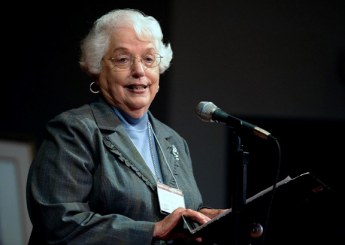Despite deep divisions in U.S. society, Christians can lead the way toward bipartisan solutions to the pain of poverty, insisted one of the world’s top hunger fighters.
“Church people — whose congregations often span the political spectrum — have the moral imperative to push for bipartisan efforts to eliminate poverty and hunger,” said David Beckmann, president of Bread for the World and 2010 recipient of the World Food Prize.
Bread for the World is a multidenominational Christian organization that urges politicians to make decisions that will alleviate hunger in the United States and around the world. Beckmann, an ordained Lutheran minister and former missionary, has led the organization since 1991.
He outlined a two-part strategy for convincing lawmakers to preserve federal programs that protect poor people: Illustrate the needs but also demonstrate how meeting those needs makes economic and political sense.
“Right now, there are huge pressures to cut programs for poor people in the name of deficit reduction,” he acknowledged.
For example, the House of Representatives is proposing a 10 percent reduction in the Women, Infants and Children (WIC) program that provides supplemental food for low-income women and children up to age 5, he said.
But that expense reduction equals bad economics, he added. The federal General Accounting Office has demonstrated WIC saves more than it costs by reducing the amount of Medicaid spent on premature babies whose mothers were undernourished during pregnancy. And long term, even moderate undernourishment of small children reduces their productivity later in life.
“It just doesn’t make economic sense to cut assistance to pregnant mothers and small children,” he said.
Globally food prices are higher than they have been in decades, and they’re expected to increase because of rising fuel costs, Beckmann reported, adding he is proud the United States has led the world in investing in poor farmers, yielding improved nutrition.
Nevertheless the House budget proposes to cut overseas agriculture support by 30 percent, meaning 19 million people worldwide will lose their dietary assistance, he said.
That doesn’t make economic sense, either, especially for fiscal conservatives, he noted. For every $1 the U.S. government spends on global hunger, other governments and groups contribute $10, leading to a “surge in investment in poor farmers.” But the budget cuts could undercut U.S. leadership in hunger reduction and cause other nations to curtail their support, he warned. And that will lead to worsened conditions for the world’s farmers, resulting in even greater need.
These aren’t simply the concerns of “bleeding-heart liberals” but also of “clear-eyed conservatives,” Beckmann said.
“Both (political) parties can agree on steps that will make aid programs for needy people work better,” he stressed. “Bread for the World is serious about using tax dollars well. … We can get bipartisan agreement to use tax dollars more effectively in foreign aid.”
In fact, Bread for the World has led the charge in demanding accountability from aid programs, he said. During the past three years, the organization has pushed for greater transparency in the programs, demanded tighter measures of effectiveness and insisted the programs “make things work better for people in need.”
The time is right for Christians to promote bipartisan support for anti-hunger programs, Beckmann noted. “Despite political polarities, Americans are more sensitive to poor people than they were 15 years ago. This especially is true with the economic recession. We’ve all been touched and just about everyone has a close friend or family member who has lost a job.”
So Christians should demand their lawmakers find other ways to reduce the federal deficit rather than shave away programs designed to help the poor and hurting, he said. Those programs that respond to people in need — both domestic and international — constitute only 15 percent of the budget.
“There are other ways to reduce the deficit: Grow the economy, go after the other 85 percent of the budget and close tax loopholes,” Beckmann suggested.
“Ask yourself, ‘What would Jesus cut?’ He wouldn’t cut WIC. The Bible doesn’t say that specifically. But the Bible says God does support the poor. We do not need to make hungry people hungrier.
“Bread for the World is grounded in Jesus and deeply connected to the Church,” he reported. “We’re grateful for the long-standing support of … Baptists, as well as Lutherans; Presbyterians; Catholics; various African-American denominations, such as the African Methodist Episcopal Church; and other groups.”
This spring, Bread for the World is providing Christians with an opportunity to call for support for the world’s poor and hungry through its annual Offering of Letters.
For more information about the project, visit www.bread.org. (ABP)




Share with others: